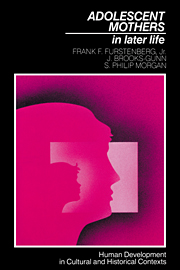Book contents
- Frontmatter
- Contents
- List of tables and figures
- Preface
- 1 Reassessing adolescent parenthood
- 2 Experience in adulthood
- 3 Pathways to success in adulthood
- 4 The children's experience
- 5 The intersecting life courses of adolescent mothers and their children
- 6 The life course of adolescent mothers: implications for public policy
- Appendixes
- Bibliography
- Index
4 - The children's experience
Published online by Cambridge University Press: 04 August 2010
- Frontmatter
- Contents
- List of tables and figures
- Preface
- 1 Reassessing adolescent parenthood
- 2 Experience in adulthood
- 3 Pathways to success in adulthood
- 4 The children's experience
- 5 The intersecting life courses of adolescent mothers and their children
- 6 The life course of adolescent mothers: implications for public policy
- Appendixes
- Bibliography
- Index
Summary
The costs of teenage parenthood may not be limited to the mothers themselves but may extend to their children as well. Children might be affected in a variety of ways. Adolescent mothers may not have much time to spend with their children due to the competing demands of school or work; they may need to piece together complex childrearing arrangements; they may not be the most competent of parents because of social immaturity or inadequate knowledge about childrearing; and of course, they are likely to be economically disadvantaged. Such conditions are believed to place the children of teenage parents at risk of developmental delays, social and emotional problems, school dropout, and early childbearing, thus helping to perpetuate a cycle of disadvantage. On the basis of rather little evidence, the supposition that disadvantage is transmitted intergenerationally in families with teenage parents seems plausible if not compelling. Recall the quotation cited in Chapter 1, which referred to the rising rates of teenage childbearing as revealing “a terrible story … children having children, passing on depression and helplessness from generation to generation.”
Popular accounts of teenage childbearing rarely fail to mention its devastating consequences for children, who are presumably likely to encounter parental neglect, child abuse, abandonment, family instability, and other forms of parental miscare. Additionally, the impoverished lives of teenage mothers and the conditions in which their children grow up are believed to contribute to high rates of school failure and juvenile delinquency.
- Type
- Chapter
- Information
- Adolescent Mothers in Later Life , pp. 77 - 105Publisher: Cambridge University PressPrint publication year: 1987



